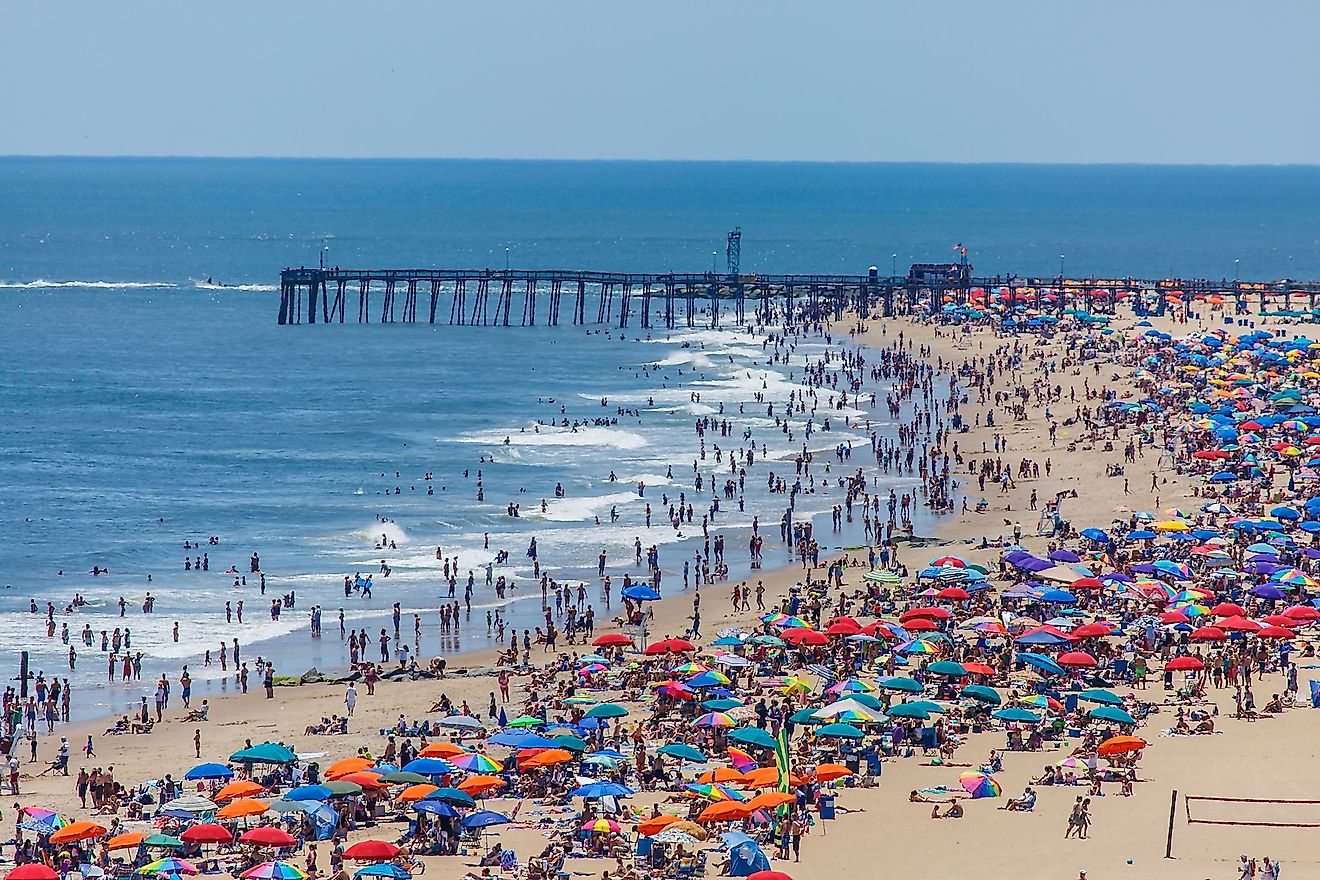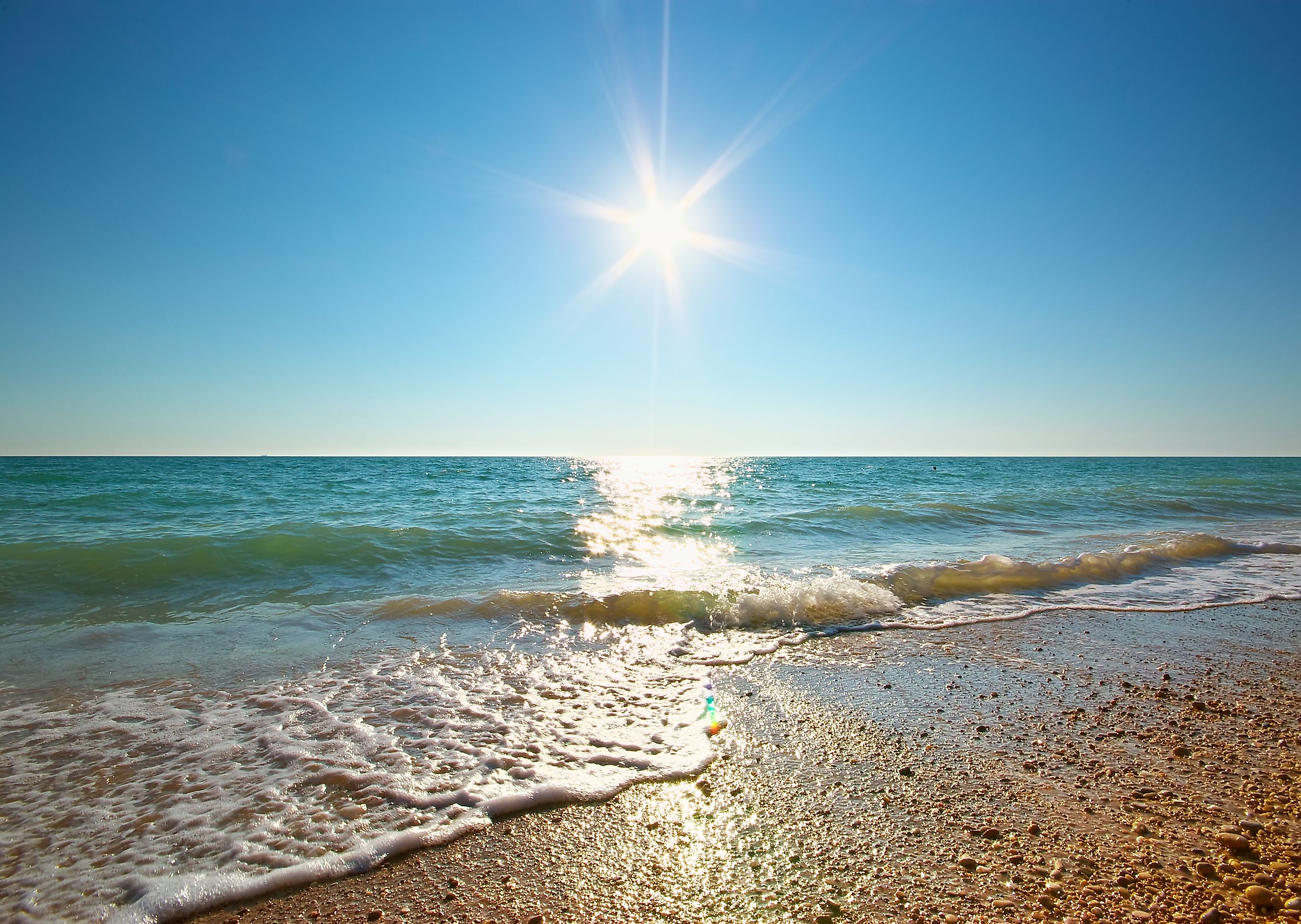
The Atlantic Ocean
The Atlantic Ocean, the world's second largest ocean, plays a crucial role in global climate, trade, and biodiversity. Covering over 41 million square miles, it spans about 20% of Earth's surface. It is bordered by the Americas, Europe, Africa, the Arctic, and the Southern Ocean, affecting weather patterns, housing diverse marine life, and serving as a key trade route. Its geological features, like the mid-Atlantic Ridge and Puerto Rico Trench, highlight Earth's dynamic processes.
Historically, it has been essential for exploration, cultural exchange, and economic growth. However, the Atlantic faces environmental challenges that threaten its ecosystems and the communities that rely on it. Preserving the Atlantic is vital for the health of our planet and future generations.
Discovering The Atlantic's Unique Features
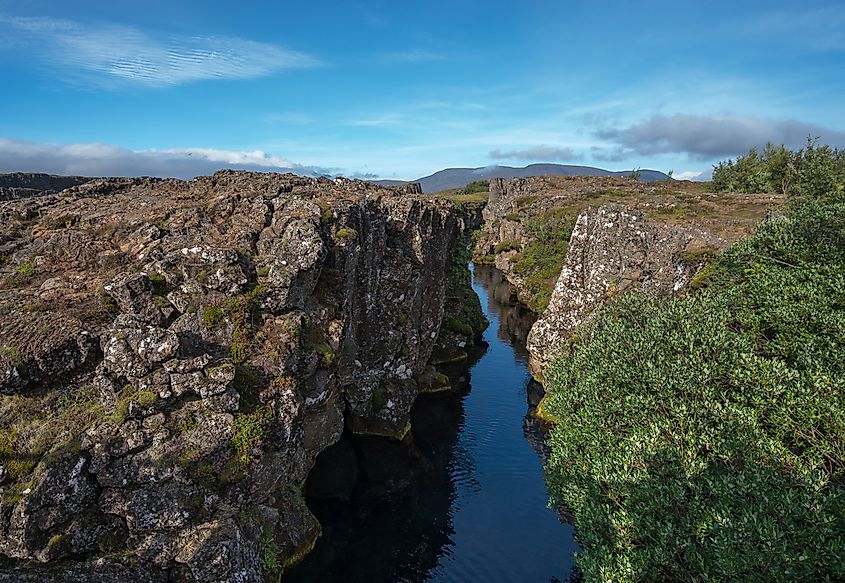
Pingvellir National park, Iceland. It lies in a rift valley that marks the crest of the Mid-Atlantic Ridge.
The Atlantic Ocean has many unique features that set it apart from other oceans. One of the most intriguing is the Mid-Atlantic Ridge, an underwater mountain range stretching about 10,000 miles, playing a key role in seafloor spreading. The Atlantic's ecosystems vary widely, from the icy waters of the North Atlantic to the warm, tropical waters of the South Atlantic, and host a remarkable array of marine life, from microscopic plankton to the majestic blue whale, the largest animal on Earth. Additionally, the Sargasso Sea in the North Atlantic is famous for its floating seaweed and unique marine species. These features not only add to the ocean's natural beauty but also provide valuable insights into Earth's geological and biological processes.
The Marine Life Of The Atlantic

The Atlantic Ocean is home to a remarkable variety of marine life, creating a vibrant and dynamic ecosystem. Its waters are filled with numerous species of fish, invertebrates, mammals, and other marine creatures that have adapted to the ocean's diverse conditions. Notable species include the Atlantic bluefin tuna, known for its size and speed, and the endangered North Atlantic right whale, which migrates through these waters.
Coral reefs in the Caribbean's warm waters support a colorful array of fish and invertebrates, while the cold, nutrient-rich waters of the North Atlantic host commercially important fish like cod, haddock, and mackerel. Additionally, the Atlantic Ocean is home to various seabirds, sea turtles, and marine mammals. Seabirds such as the Atlantic puffin and northern gannet feed here, while loggerhead and leatherback sea turtles travel across its vast expanse during their migrations. Marine mammals, including dolphins, seals, and orcas, are often seen navigating these diverse habitats. Each of these species is essential for maintaining the health and balance of the marine ecosystem, making the Atlantic a crucial area for biodiversity conservation.
Popular Tourist Destinations Along The Atlantic
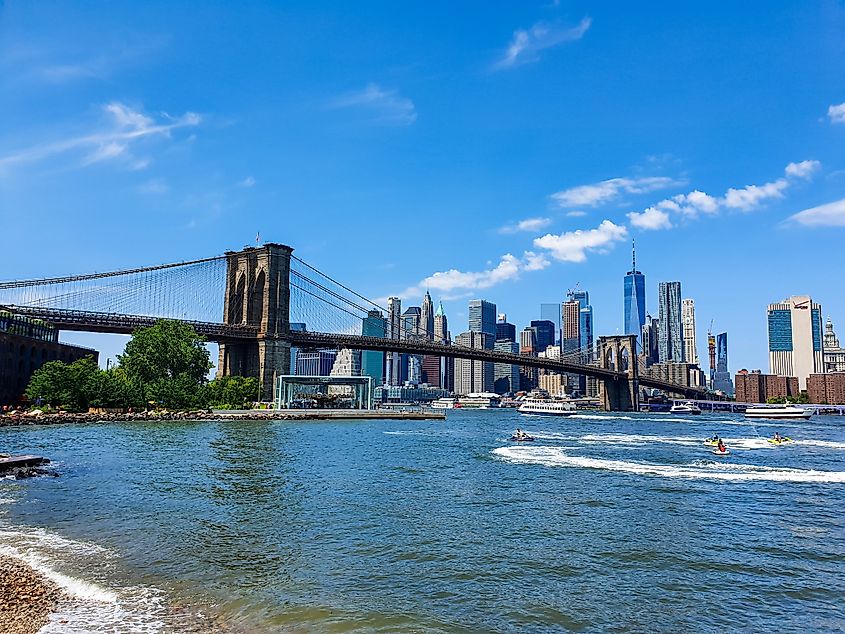
View from Dumbo over Brooklyn bridge.
The Atlantic Ocean offers a variety of tourist destinations that appeal to different interests. One of the most iconic spots is New York City's coastline, where visitors can see the historic Statue of Liberty and enjoy the lively atmosphere of Coney Island. Further south, Miami Beach features vibrant nightlife and pristine waters perfect for swimming and surfing. Across the ocean, coastal towns in Portugal, such as Lisbon and Porto, captivate travelers with their rich history, stunning architecture, and delicious seafood. The Caribbean islands, with their crystal-clear waters, are popular too, with places like the Bahamas and the Dominican Republic offering beautiful beaches, luxurious resorts, and unique cultural experiences. Each destination, connected by the vast Atlantic, showcases the beauty and diversity of coastal life.
You May Also Like: Prettiest US Islands To Visit In 2024
Recreational Activities
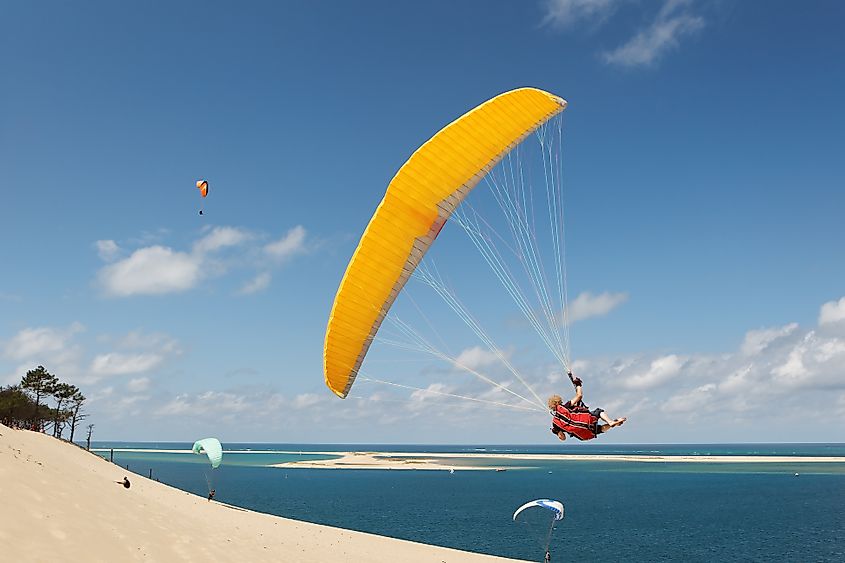
For those seeking adventure, the Atlantic Ocean and its surroundings offer a variety of thrilling activities. Surfing enthusiasts can catch powerful waves along Portugal and the Canary Islands, known for their challenging swells. Scuba divers will be mesmerized by the vibrant coral reefs of the Bahamas and the shipwreck-strewn waters of Bermuda. The Azores, with their dramatic landscapes, provide ample opportunities for hiking, canyoning, and whale watching. Kayakers can explore the rugged coastlines and hidden coves of Cape Cod, while sailors can test their skills on a transatlantic voyage. For a unique experience, adventurers can explore the underwater volcanic formations and lava tubes of the Canary Islands. Each destination offers a range of activities for the bold and brave, promising unforgettable experiences amidst nature’s stunning beauty.
Cultural Impacts

The Atlantic Ocean has long been a channel for cultural exchange, enabling the movement of people, ideas, and traditions between continents. From the age of exploration to today, this vast body of water has been crucial for trade and migration, shaping the cultures of many nations. The transatlantic slave trade, though tragic, led to the blending of African, European, and indigenous cultures, creating unique cultural identities in the Americas. Likewise, European settlers brought new agricultural practices, languages, and religions to the New World, significantly influencing societies on both sides of the Atlantic. Nowadays, the Atlantic continues to support cultural connections through tourism, international collaborations, and digital communication, ensuring that the exchange of cultural practices and innovations continues dynamically.
The Future Of The Atlantic Ocean
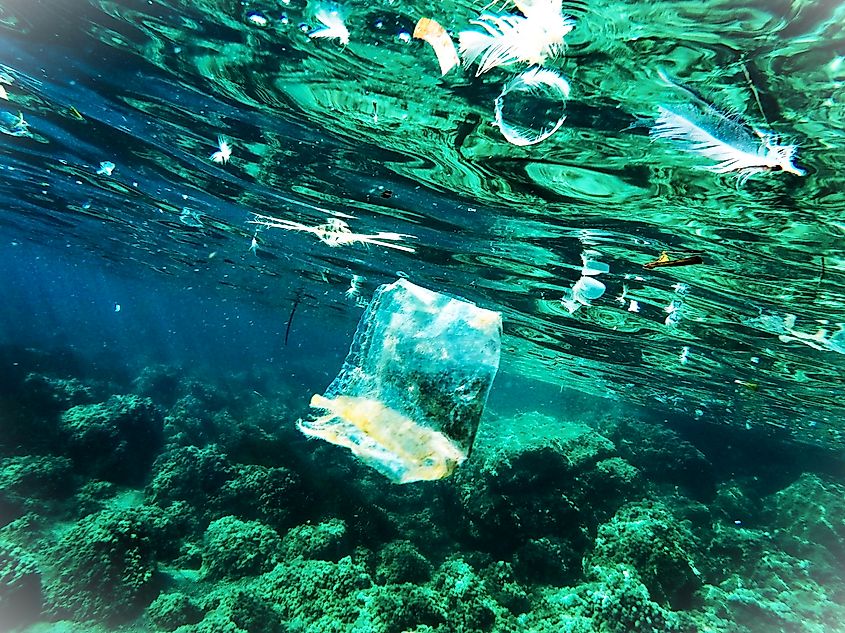
Plastic bag and feathers in the sea, plastic garbage, waste, trash.
The future of the Atlantic Ocean presents both challenges and opportunities, requiring focused efforts on environmental conservation and sustainable development. Climate change poses serious threats, with rising sea levels and warming ocean temperatures affecting marine ecosystems and coastal communities. Pollution, especially from plastic waste, continues to damage water quality and harm marine life. However, there are also opportunities for improvement. Advances in renewable energy, like offshore wind farms, offer promising alternatives to fossil fuels, potentially reducing carbon emissions and promoting cleaner oceans. International collaborations and regulatory frameworks are crucial for protecting marine biodiversity and preserving ocean health. Additionally, increasing public awareness and education can boost conservation efforts, ensuring future generations enjoy a thriving and resilient Atlantic Ocean. Sustainable practices and collective action are essential for safeguarding this vital natural resource.
The Atlantic's Role In Shaping Our World
The Atlantic Ocean is a vast and dynamic entity that has shaped human history and continues to play a crucial role in our world. From its diverse marine life and cultural significance to its impact on weather and climate, the Atlantic offers endless opportunities for exploration and discovery. For travel enthusiasts, tourists, and US citizens, the Atlantic is more than just a body of water—it's a source of adventure, inspiration, and connection. Whether you're sailing its waters, exploring its shores, or learning about its rich history, the Atlantic Ocean invites you to discover its wonders. Ready to start your Atlantic adventure? Explore our travel guides, join our community of ocean enthusiasts, and stay updated on the latest news and events. The Atlantic awaits—dive in and discover all it has to offer!
